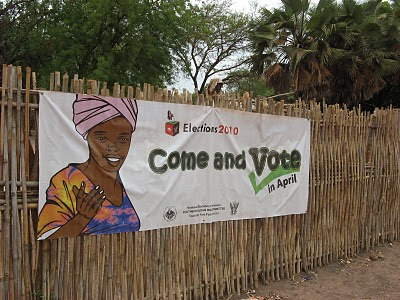In the main towns of S.Sudan (which are few and far between) it is possible to purchase fruit and vegetables and basic supplies—soap and salt, batteries and brooms, cooking oil and toilet paper, and the ever present Coca Cola. But once you travel out into the rural areas, one’s choices become much more limited. For the most part, people eat ugali (maize which has been ground to a polenta-like substance akin to mashed potatoes), augmented at times by beans and okra and milk from goats or cattle. No See’s candy, that’s for sure! The food is, however, satisfying and healthy except when the rains fail and the cattle die and the crops do not grow. Shown here is the market in S. Sudan's 2nd largest city, Rumbek, where Mercy Beyond Borders supports women's literacy classes.
Sand Storms in Sudan
14 years ago
























